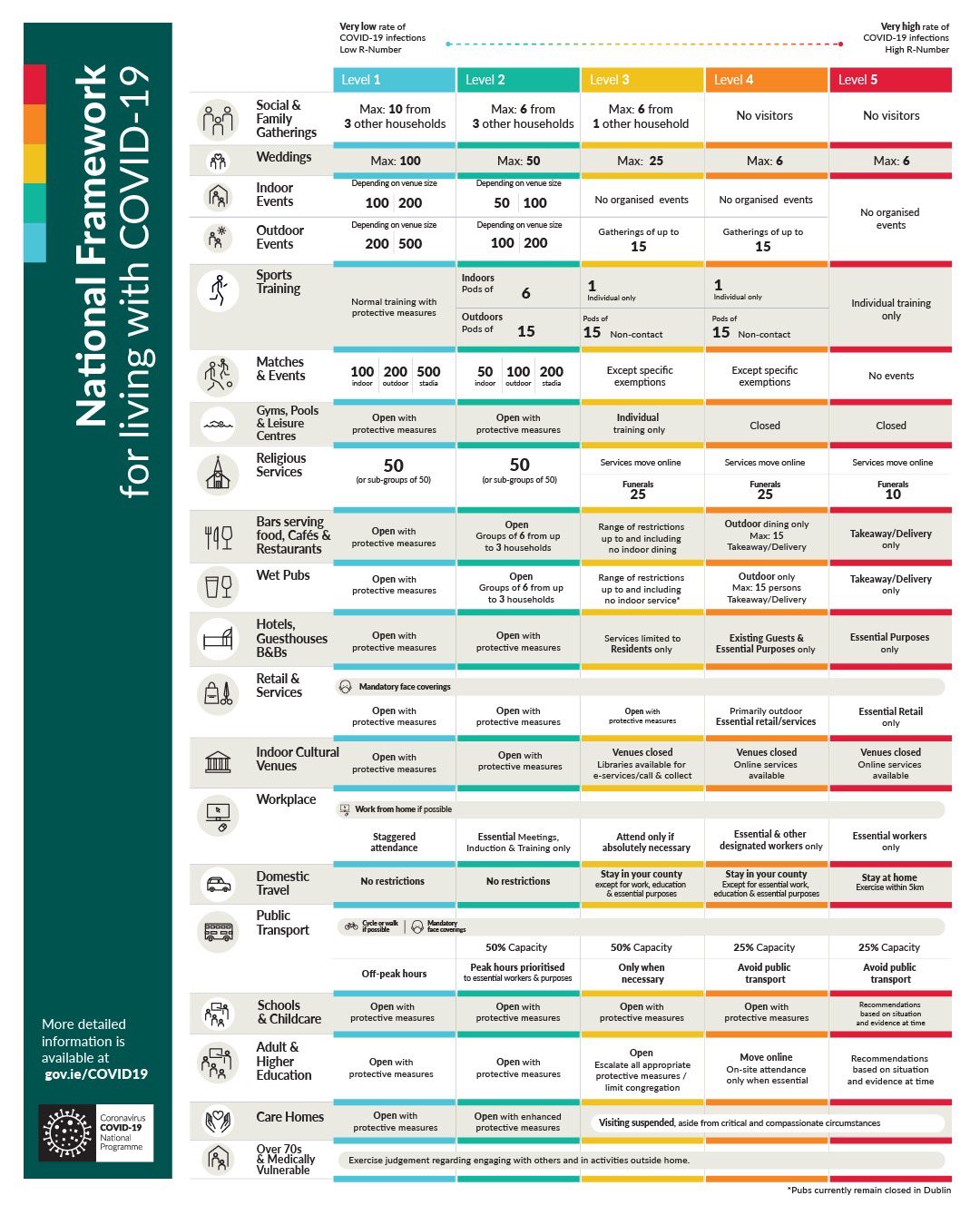• Plan for living with Covid-19 shows families, business & society how to respond to emerging Covid situation over next 7 months
• €600M in funding agreed for health service Winter Initiative

The Government has today published Resilience & Recovery 2020-2021: Plan for Living with Covid-19 which will guide Ireland’s response to saving lives and managing the pandemic over the next seven months.
It sets out how Ireland and the Irish people can continue managing the disease in a rapidly changing global environment.
Cabinet also agreed to allocate a record €600 million for the 2020 Winter Initiative, to ensure that our health service has the capacity and resources needed to deal with what is forecast to be a particularly challenging few months.
The plan sets out five levels of response, each with a number of measures designed to help us all lower Covid-19 transmission, and setting out what is permitted at that moment in time. It aims to allow society and businesses to be able to operate as normally as possible, while continuing to suppress the virus.
In particular, keeping schools, early learning and childcare services open are a top priority. We want to keep people in work, and businesses operating, as we need a functioning economy to maintain our public services.
Each level outlines what is permitted for social or family gatherings, work and public transport, bars, hotels and restaurants, exercise activities and religious services.
In terms of gatherings, life events like weddings and funerals, and sports and arts events in controlled environments are given priority. The plan also aims to maintain access to some form of sports and social activities because they support us in living with the disease.
Aside from agreeing to the framework, other key decisions taken at Cabinet include:
•The national public health restrictions at Level 2 of the new framework will be effective until October 4th;
•Additional transitional measures will be introduced for Dublin based on NPHET’s recommendations given concerns about the rising incidence of Covid-19 in the region;
•So-called wet pubs will be permitted to open on September 21st, with the exception of Dublin;
•Ireland will broadly support the European Commission’s proposal for a common approach to travel within the EU. Countries with a 14-day cumulative rate of disease incidence per 100,000 of 25 or less will be included on the "Normal Precautions" (green) list.
The Framework
The Framework sets out how everyone - individuals, families, businesses, and organisations can plan for the next seven months, depending on the incidence of the disease at that moment in time. So its priorities for us all are:
•Staying Safe: Targeted prevention, mitigation and management of Covid-19 within the population;
•Being Prepared & Responsive: ensuring that the health service and wider public service can respond rapidly to changing trends;
•Resuming Public Service Delivery: resuming and maintaining critical education, health and other public services;
•Developing Economic Resilience: helping businesses to operate safely in a Covid-19 environment, and get the help they need to adapt and survive;
•Growing our Resilience: maintaining our individual and collective resilience, and supporting each other to cope with the stresses and difficulties;
•Remembering our Loss: taking time to reflect and commemorate.
Each of the levels has specific guidance for the following areas:
•Social/family gatherings
•Organised indoor gatherings
•Organised outdoor gatherings
•Exercise and sporting events
•Religious services
•Museums and galleries
•Bars. Cafes and restaurants
•Hotels & Accommodation
•Retail and personal services
•Public transport
•Work
•Travel restrictions
•Schools, creches and higher education
•Outdoor playgrounds
•Those aged over 70 or medically vulnerable
Additional restrictions in County Dublin
Given concern over the incidence of Covid-19 in Dublin, and based on NPHET’s recommendations, Cabinet agreed that additional measures will apply in the county:
- No more than two households should meet at any given time, and people should have a maximum of six visitors from one other household to their home. Socialising can continue at indoor or outdoor public venues, but only with people from their own household or one other household, and in groups of no more than six;
- Pubs and bars not serving food should remain closed beyond September 21st;
- Higher and third level institutions should consider enhanced protective measures;
- Those living in Dublin should be encouraged to limit travel outside the region, and only meet one other household when outside the county.
The power to control this pandemic is still in our hands. Irish people have shown time and again that they will follow the public health advice in order to protect themselves, their families, and society as a whole. We need this co-operation and compassion to continue for the period ahead to continue fighting the disease, and to protect the most vulnerable people in society.